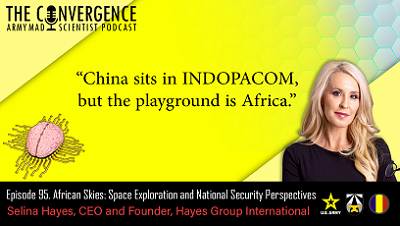“China sits in INDOPACOM, but the playground is Africa.”
[Editor’s Note: Regular readers of the Mad Scientist Laboratory will recall that the Office of the Director of National Intelligence (ODNI) reported, “Relatively poor countries in Sub-Saharan Africa and South Asia will account for almost all global population growth during the next two decades…” The World Economic Forum supported this assessment, projecting that Africa’s population is likely to triple by 2100. Specifically, Nigeria is set to become the second most populous country in the world by 2100, trailing only India.
The significance of this growth is not lost on China — our pacing challenge has already established a permanent military presence in Djibouti and it is seeking  to establish another military base at Malabo, Equatorial Guinea. China is investing strategically throughout sub-Saharan Africa — it is now Africa’s biggest trading partner, with Sino-African trade exceeding $200 billion per year, and Africa has surpassed Asia as the largest market for China’s international construction projects. China continues to exert its influence across the continent via its Belt and Road Initiative.
to establish another military base at Malabo, Equatorial Guinea. China is investing strategically throughout sub-Saharan Africa — it is now Africa’s biggest trading partner, with Sino-African trade exceeding $200 billion per year, and Africa has surpassed Asia as the largest market for China’s international construction projects. China continues to exert its influence across the continent via its Belt and Road Initiative.
In today’s episode of The Convergence podcast, Army Mad Scientist sits down with Selina Hayes, Founder and CEO of The Hayes Group International, to discuss the nexus of space investment and operations in Africa — a critical region of focus for our adversaries — and the potential implications for the U.S. Army — Enjoy!]
[If the podcast dashboard is not rendering correctly for you, please click here to listen to the podcast.]
 Selina Hayes founded Hayes Group International (HGI) to provide unique access to people, places, and data. Designed to disrupt, Ms. Hayes has access to strategic partners and networks across Africa and the Pacific. With her intelligence background and unique on-the-ground experience, HGI has developed and delivered solutions involving multiple intelligence sensors, information gateways, information operations, cultural intelligence, data collection, geospatial, ISR, and Space-as-a-Service. Ms. Hayes has extensive experience leading defense and international business development strategies for emerging and disruptive ISR, PED, and geospatial technologies. She successfully combined the innovation of Silicon Valley with Washington, having successfully launched three new technologies in the DoD ecosystem to expand the capabilities of our country. As HGI’s CEO, Ms. Hayes has introduced her connections in Africa and the Pacific with this unique access to exquisite data sources and nonconventional methodologies.
Selina Hayes founded Hayes Group International (HGI) to provide unique access to people, places, and data. Designed to disrupt, Ms. Hayes has access to strategic partners and networks across Africa and the Pacific. With her intelligence background and unique on-the-ground experience, HGI has developed and delivered solutions involving multiple intelligence sensors, information gateways, information operations, cultural intelligence, data collection, geospatial, ISR, and Space-as-a-Service. Ms. Hayes has extensive experience leading defense and international business development strategies for emerging and disruptive ISR, PED, and geospatial technologies. She successfully combined the innovation of Silicon Valley with Washington, having successfully launched three new technologies in the DoD ecosystem to expand the capabilities of our country. As HGI’s CEO, Ms. Hayes has introduced her connections in Africa and the Pacific with this unique access to exquisite data sources and nonconventional methodologies.
Army Mad Scientist sat down with Ms. Hayes to discuss her work in creating access to the Space Domain in Africa and why the DoD should pay more attention to that continent. The following bullet points highlight key insights from our conversation:
-
-
 The Hayes Group International is a team of individuals that problem solves in unique parts of the world, specifically the continent of Africa, focusing on disruptive technology and how that tech is integrated into society.
The Hayes Group International is a team of individuals that problem solves in unique parts of the world, specifically the continent of Africa, focusing on disruptive technology and how that tech is integrated into society.
-
-
-
-
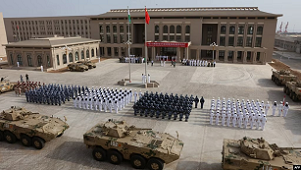
China’s permanent military presence in Djibouti, established in 2017 / Source: Observers: China’s New Base in Djibouti to Aid Economic Expansion in Africa, Voice of America Africa has become less of a focus with the U.S. national security shift from counterinsurgency to strategic competition — however, Africa is a playground for our adversaries. From a national security standpoint, it is critical to assess Chinese and Russian influences on the continent.
-
-
-
-
- Financial institutions and commercial entities play an influential role in most African countries. Companies, such as Walmart and Amazon, are often more influential to Africa than some nations. DoD has an opportunity to evaluate the role these organizations could play in national security and possible prospects for future collaboration in the region.
-
-
-
- Africa is home to natural reserves of several rare earth materials needed for satellites and other critical military and commercial technology.
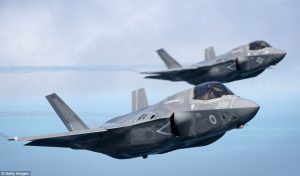 More than 950 pounds of rare earth and critical minerals go into every F-35 combat aircraft and Cobalt is used as a vital component of lithium-ion batteries, of which 68% of the world’s supply of cobalt sits in the ground in the Democratic Republic of Congo.
More than 950 pounds of rare earth and critical minerals go into every F-35 combat aircraft and Cobalt is used as a vital component of lithium-ion batteries, of which 68% of the world’s supply of cobalt sits in the ground in the Democratic Republic of Congo.
- Africa is home to natural reserves of several rare earth materials needed for satellites and other critical military and commercial technology.
-
-
-
- The Hayes Group International, along with partners in Kenya, are working to establish a space port on the east coast of Africa. A space port would economically and strategically benefit Kenya, Africa, and surrounding nations, as many countries and organizations, including the
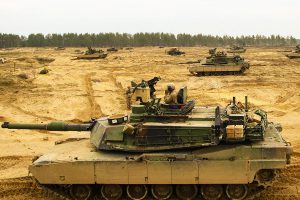 U.S. and DoD, heavily depend on space-based capabilities. Today’s maneuver Brigade Combat Team (BCT) has over 2,500 pieces of equipment dependent on space-based assets for Positioning, Navigation, and Timing (PNT). The Army has the opportunity to explore this region cooperatively, and gain access to a new set of capabilities in a geographically and strategically important area.
U.S. and DoD, heavily depend on space-based capabilities. Today’s maneuver Brigade Combat Team (BCT) has over 2,500 pieces of equipment dependent on space-based assets for Positioning, Navigation, and Timing (PNT). The Army has the opportunity to explore this region cooperatively, and gain access to a new set of capabilities in a geographically and strategically important area.
- The Hayes Group International, along with partners in Kenya, are working to establish a space port on the east coast of Africa. A space port would economically and strategically benefit Kenya, Africa, and surrounding nations, as many countries and organizations, including the
-
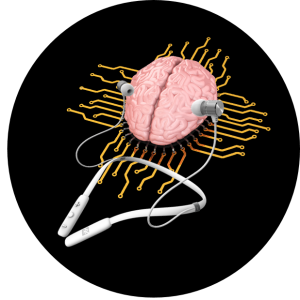
Stay tuned to the Mad Scientist Laboratory for our next episode of The Convergence podcast on 18 April 2024.
If you enjoyed this post, check out the TRADOC G-2’s Operational Environment Enterprise public facing page, brimming with threat content, including:
Our China Landing Zone, full of information regarding our pacing challenge, including ATP 7-100.3, Chinese Tactics, BiteSize China weekly topics, People’s Liberation Army Ground Forces Quick Reference Guide, and our thirty-plus snapshots captured to date addressing what China is learning about the Operational Environment from Russia’s war against Ukraine (note that a DoD Common Access Card [CAC] is required to access this last link).
… our Russia Landing Zone, including the BiteSize Russia weekly topics. If you have a CAC, you’ll be especially interested in reviewing our weekly RUS-UKR Conflict Running Estimates and associated Narratives, capturing what we have been learning about the contemporary Russian way of war in Ukraine over the past two years and the ramifications for U.S. Army modernization across DOTMLPF-P
… and our Iran and North Korea Products pages, with additional threat information
Also review the following Mad Scientist Laboratory space and technology content:
Building Beyond: Preparing the Army for Lift-Off and associated podcast, with Dr. Olga Bannova
LSCO, PNT, and the Space Domain, by CPT Matthew R. Bigelow
Space: Challenges and Opportunities
Star Wars 2050, The Final Frontier: Directed Energy Applications in Outer Space, and The Evolution of Nation-States and Their Role in the Future, by proclaimed Mad Scientist Marie Murphy
Beyond Space and associated podcast, with proclaimed Mad Scientist Kara Cunzeman
Space 2035: A Surplus of Uncertainty and a Deficit of Trust, by Maj Rachel Reynolds
Accelerating American Space Settlements, by Dr. Lydia Kostopoulos
Table of Future Technologies: A 360 Degree View Based on Anticipated Availability, by Richard Buchter
… as well as the Dr. Moriba Jah on What Does the Future Hold for the US Military in Space? podcast hosted by our colleagues at Modern War Institute.
>>>>REMINDER: Army Mad Scientist wants to crowdsource your thoughts on asymmetric warfare — check out our Operational Environment Wicked Problems Writing Contest.
All entries must address the following topic:
How have innovations in asymmetric warfare impacted modern large scale and other combat operations, and what further evolutions could take place, both within the next 10 years and on towards mid-century?
We are accepting three types of submissions:
-
-
- 1500-word Non-Fiction Essay
-
-
-
- 1500-word Fictional Intelligence (FICINT) Story
-
-
-
- Hybrid 1500-word submission incorporating a short FICINT vignette, with a Non-Fiction Essay expounding on the threat capabilities described in the vignette
-
 Anyone can participate (Soldiers, Government Civilians, and all global citizens) — Multiple submissions are encouraged!
Anyone can participate (Soldiers, Government Civilians, and all global citizens) — Multiple submissions are encouraged!
All entries are due NLT 11:59 pm Eastern on May 16, 2024 at: madscitradoc@gmail.com
Click here for additional information on this contest — we look forward to your participation!
Disclaimer: The views expressed in this blog post do not necessarily reflect those of the U.S. Department of Defense, Department of the Army, Army Futures Command (AFC), or Training and Doctrine Command (TRADOC).

